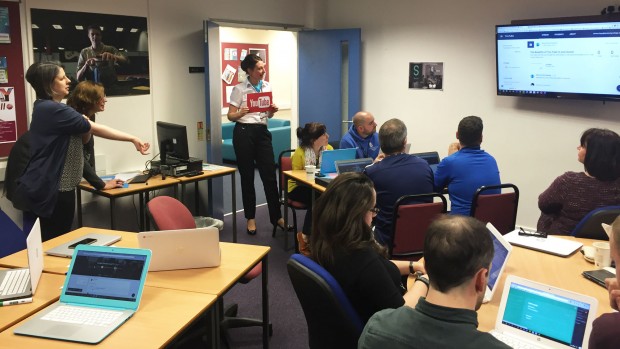C-Learning puts the "cloud first" in education
UK schools and colleges are only just entering the cloud revolution

The trend is clear: educational IT services are moving to the cloud. There may only be a minority of UK schools and colleges that have currently moved over, but the shift is inexorable, because the benefits are clear and work on a number of levels - educational, operational and financial. C-Learning provides services to help support a school or college transition to the cloud, drawing on extensive UK and international experience focused entirely on education.
The most obvious benefit of moving to the cloud, particularly when taking the Google G Suite for Education approach, is the cost. In addition to G Suite for Education being free, the price of a Google Chromebook, from HP for example, is low enough that an entire student cohort can be equipped with one. There are many successful models of adoption across primary, secondary and independent schools and colleges. The use of a computer in school used to be confined to a dedicated IT room where screen time had to be booked. Teachers would have to shape their lessons around availability, and ensure they make use of the computer-room time that had been allotted.
But when every student has a device that can access online content and software with them at the times they need, then it's a complete game changer. The services available can be used when they fit the flow of teaching, rather than the other way around, which is a much more natural approach. Every student will have access to the tools to write and create presentations, for example, and can perform their own online research. Cloud-based tools are also naturally collaborative, since they're delivered from a shared space that all the users have in common. The ability to work together in this way is a fundamentally important skill for school students to learn.
A more tacit benefit from using cloud services in educational IT provision is that the students will become familiar with them. Since the cloud is becoming rapidly adopted in the commercial world, and is likely to be as dominant in this realm as it is becoming in education, it's important that the students learn about this mode of interaction with IT services. The skills they acquire accessing cloud services for education will prepare them for their future in the world of work.
The benefits for school and college IT organisation go well beyond mere cost savings, too, even if these are tremendously important in these times of tight budgets. Providing services via Google's G Suite for Education on Chromebooks means that a consistent set of applications and other online facilities can be delivered across an entire student population. There's no need to go from machine to machine to install new software and updates. Since every user gets their provision from the same cloud repository, they always have the latest versions of the software supplied by the school or college. Implementing new features will be equally uncomplicated.
This is why C-Learning promotes a "cloud-first" strategy to help schools and colleges make the transition, arguing that the switch to the cloud should be central to any development plan and planned IT upgrades. The company's G Suite for Education Accelerator service provides schools and colleges with assistance when setting up their cloud services to make sure they're using their services in the shortest time possible. One of the key ways this assistance is delivered is through professional development and training. C-Learning helps schools build internal expertise in G Suite and to understand the impact its usage will have on learning and teaching. C-Learning was one of the first companies to sell Chromebooks in the UK when they were launched, so they have been promoting early adoption since the beginning.

C-Learning is a relatively young company, founded in 2011, but has already developed an extensive UK and international network of partners, from whom advice can be drawn for the benefit of schools and colleges just starting out on the road to cloud adoption. C-Learning will put a headteacher or a college principal contemplating the cloud in touch with another that has already taken their school or college on the journey, so that they can learn from real experience on the "front line". The service that C-Learning provides isn't just for a brief time of initial transition, either. The company will constantly revisit a school or college provision to help them grow their cloud learning services as their needs develop, since more benefits from cloud services are arriving all the time.
Although Google Chromebooks have been a major enabler in this cloud revolution, the hardware is decreasingly important, and shouldn't be a hindrance to adoption. Where two-thirds of US schools use cloud-based IT services, in the UK it's more like one-third. So there's huge room for growth, but in the UK adoption has reached a point of critical mass. Schools are beginning to see the benefits of cloud technology to student literacy and numeracy levels. For this reason, the cloud is not merely a change in the structure of IT provision from on-premise to the cloud, but should be fully integrated into a shift in a school's or college's approach to education.
Cloud technologies promise a new era in digitally enabled learning, with reduced costs and an ever-expanding array of new tools for education. With its pure focus on and expertise in delivering the cloud for education, C-Learning is in an ideal position to help schools and colleges realise that promise - a safe and secure cloud-learning service tailored specifically for their current needs, but with room to grow as these needs develop over time.
Bett 2017 show preview - what should you definitely see?
Get the ITPro daily newsletter
Sign up today and you will receive a free copy of our Future Focus 2025 report - the leading guidance on AI, cybersecurity and other IT challenges as per 700+ senior executives
Dr James Morris has worked as a technology journalist for over 25 years, including spending nine years on the staff of market-leading computer magazine PC Pro, the last five of which were as the publication’s editor. He specialises in enterprise-grade software and hardware, with a particular focus on content creation. He launched a pioneering video channel for HEXUS.net in 2006 and ran the video reviews channel for TrustedReviews.com for four years. He also runs a successful online digital content and commercial video production company, t-zero communications Ltd.
Dr Morris is a prolific technology writer and contributes commercial content for major IT brands including AMD, BlackBerry, Dell, Cognizant, HP, and IBM. He published a book on artificial intelligence, Can Computers Create Art? in 2009. He is also an academic, and is currently Pathway Director of the MA, Interactive Journalism at City, University of London.
Previously, he was course leader for the BA in Web Media Production at Ravensbourne University. He has a PhD in Philosophy, Art and Social Thought from the European Graduate School in Switzerland, a Master's in Media Arts from the New School in New York, USA, and a Bachelor's in Social Anthropology from the London School of Economics.
Dr. Morris can be found on Twitter at @Cyberwest, or emailed at j@tzero.co.uk
-
 Bigger salaries, more burnout: Is the CISO role in crisis?
Bigger salaries, more burnout: Is the CISO role in crisis?In-depth CISOs are more stressed than ever before – but why is this and what can be done?
By Kate O'Flaherty Published
-
 Cheap cyber crime kits can be bought on the dark web for less than $25
Cheap cyber crime kits can be bought on the dark web for less than $25News Research from NordVPN shows phishing kits are now widely available on the dark web and via messaging apps like Telegram, and are often selling for less than $25.
By Emma Woollacott Published
-
 European Electronique’s Freedom Cloud
European Electronique’s Freedom CloudSponsored Freedom Cloud helps schools move to a fully managed public or hybrid cloud with educational IT provision
By James Morris Published
-
 Getech Education helps schools move to the cloud
Getech Education helps schools move to the cloudSponsored Taking a school's classroom IT to the cloud needs careful consideration
By James Morris Published
-
 RM Buzz from RM Education
RM Buzz from RM EducationSponsored RM Buzz adds user-focused filtering on Chromebooks for students using RM Unify and G Suite for Education
By James Morris Published
-
 BETT 2017: don't drown schools in wave of ed tech
BETT 2017: don't drown schools in wave of ed techOpinion Finding the right tech in the flood of options isn't easy for schools
By Nicole Kobie Published
-
 How teachers brought Minecraft into classrooms
How teachers brought Minecraft into classroomsNews Microsoft and Minecraft reveal new teacher tools for using the game in schools
By Nicole Kobie Published
-
 HP: VR and two-in-ones are the future of ed tech
HP: VR and two-in-ones are the future of ed techAnalysis HP's head of education predicts the future of technology in classrooms
By Nicole Kobie Published
-
 Why fun tech is good for schools
Why fun tech is good for schoolsAnalysis Lego and Minecraft are sweeping education tech – but do they offer more benefit than making school fun?
By Nicole Kobie Published
-
 Simplifying tech for schools
Simplifying tech for schoolsAnalysis Chromebooks, Microsoft Intune and more are trying to make it easier for schools to buy and manage technology
By Nicole Kobie Published